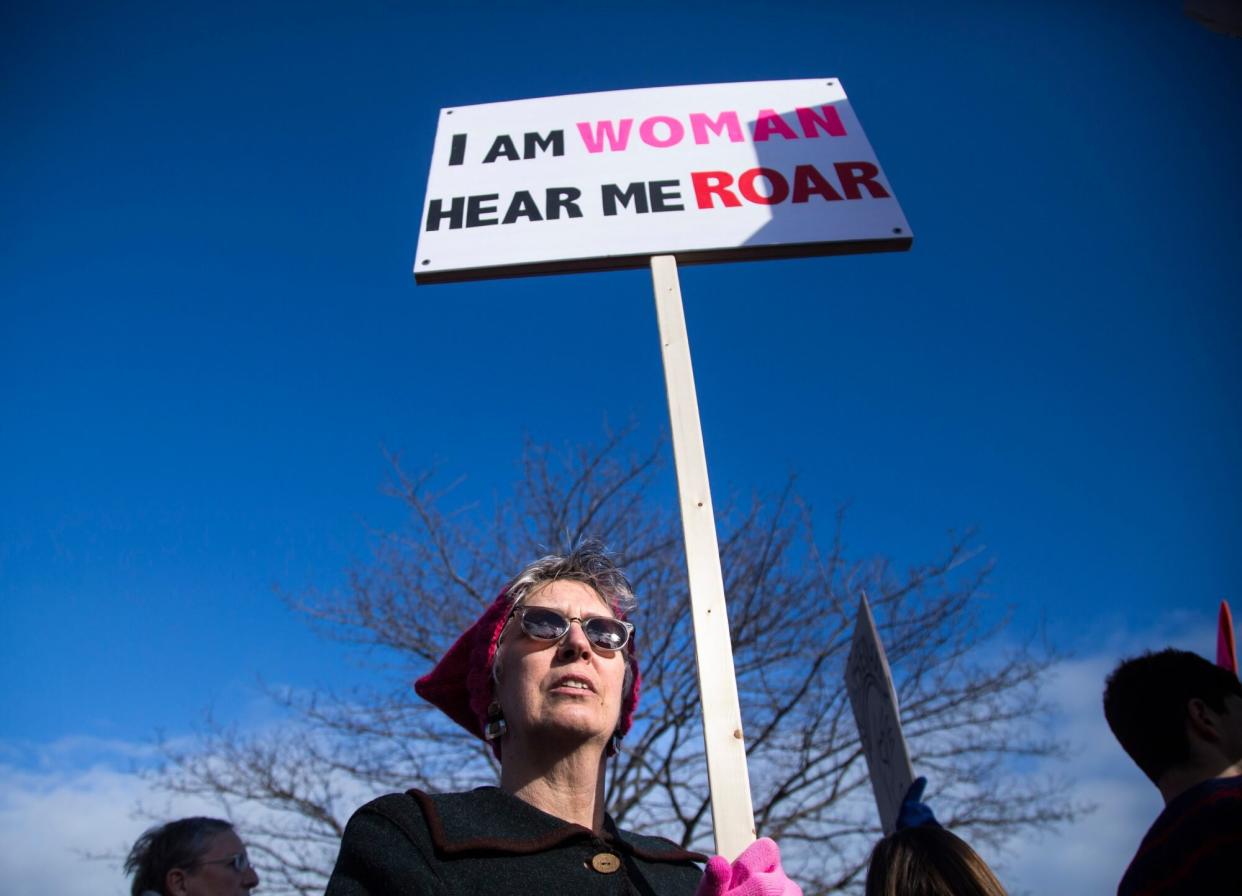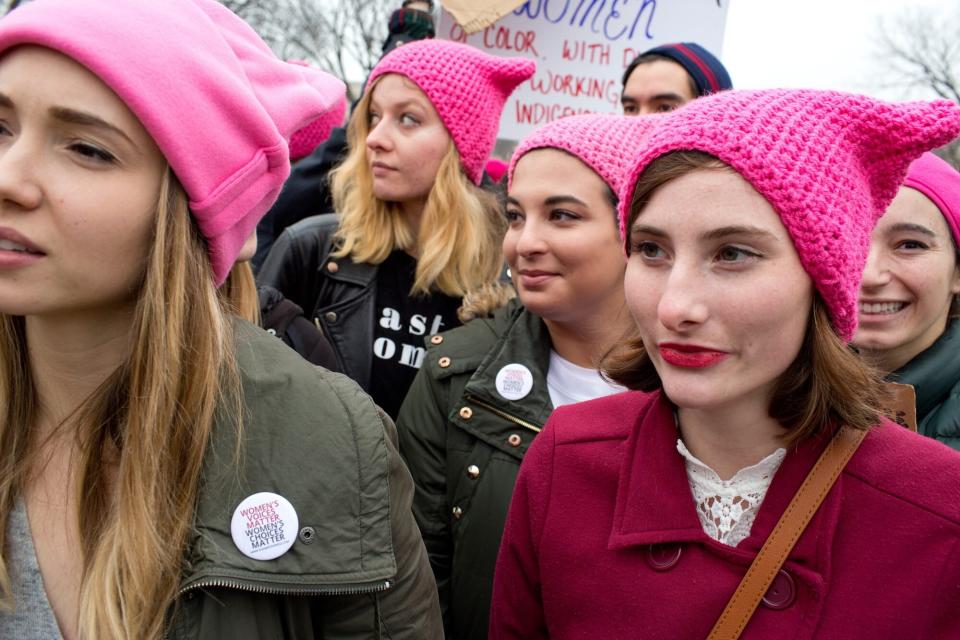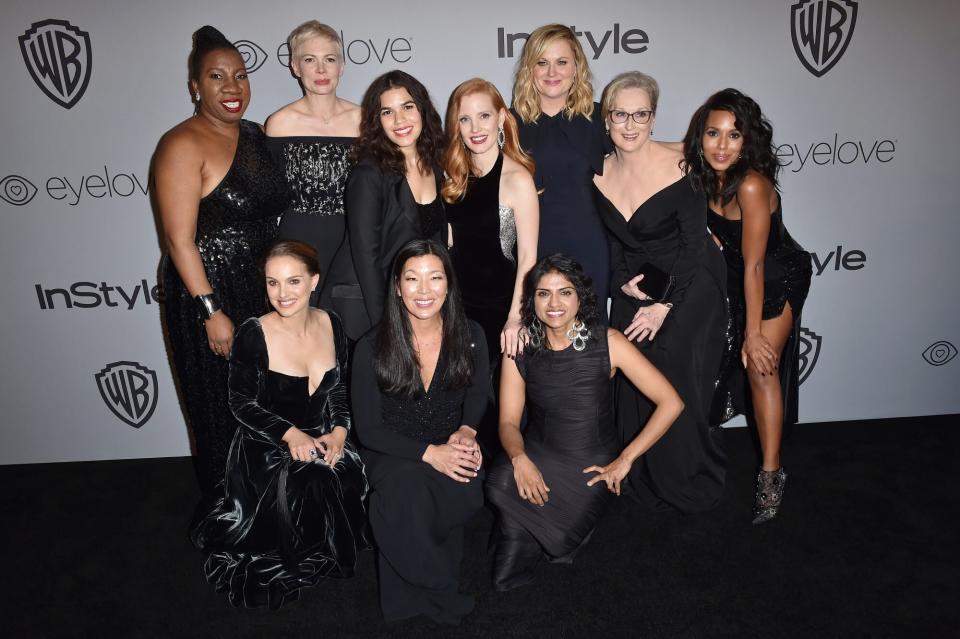Women's Rights Wins That'll Fill You With Optimism

Getty Images
For many women, the election of Donald Trump felt like a personal defeat—it marked the loss of the first viable female presidential candidate, raised concerns about women’s healthcare, and evoked the sting of sexist comments made by the commander-in-chief and unearthed in the months leading up to the vote. But rather than relent, women have responded with a rapid-fire reckoning for which it’s difficult to think of a comparison. Women made a whopping 86% of activist calls to Congress protesting White House policies, according to one poll; they’ve launched headline-grabbing campaigns like the Women’s March and Time’s Up; and they’ve made bids for public office in the thousands.
“Feminism” is a concept many still seem to struggle with—it was one of 2017’s most-searched-for terms—but it was also Merriam-Webster’s word of the year, a dichotomy that captures what’s been driving the women’s movement since last January: frustration has fueled organized action.
VIDEO: Women's March 2018 Best Moments
Over the roller coaster year since Trump’s inauguration, women's rights activists have prominently thrown down the gauntlet and worked behind the scenes. First and foremost, they made clear who they want in office going forward (and it doesn’t look like this).
BRINGING POWER TO THE POLLS
In the weeks following Donald Trump’s win (and Hillary Clinton’s loss) women decided to run for office in floodgate-opening numbers. More than 6,000 women contacted She Should Run, an organization serving women exploring bids, a surge of nearly 3,000% compared with prior post-election periods. The number of women expected to challenge incumbents in the U.S. House this year is up nearly 350%, TIME reports. And in recent local elections, women have already seen staggering success rates: in the Virginia state legislature, nine out of 30 women challenging incumbents won, nearly flipping it blue.
Amanda Litman, who led emails for Hillary Clinton’s campaign (not those emails), wasted no time after the election in co-founding Run for Something, a non-profit that supports and trains progressive young people to run for office. “People cope with grief in different ways,” she told InStyle. “My coping mechanism was working as hard as I could.” In its first year, Run for Something has been contacted by 15,000 young people interested in a first-time bid.

Jenny Anderson/Getty Images
RELATED: Time's Up: Exclusive Interviews with the Women Behind the Movement
One of them was Ashley Bennett, a 32-year-old who decided to run for a county commissioner position in New Jersey after seeing a sexist meme that her opponent posted on Facebook about the Women’s March. “How do you have the time to be on social media belittling and mocking people when there is all this work to be done?” she said at the time. That sense of urgency—and disgust—inspired her to take the work into her own hands.
Bennett won her seat. As did fellow Run for Something candidate Danica Roem, the first openly trans person in a state legislature; Vi Lyles, the first African-American female mayor of Charlotte; and Cathy Murillo, the first Latina mayor of Santa Barbara, to name a few.
Women are far from a unified block of voters, as the 2016 election made clear, but they're a powerful one. Last month, African-American women in Alabama were credited with helping elect a Democrat as their senator for the first time in 20 years. This year’s Women’s March is taking place in Las Vegas this weekend and will kick off #PowerToThePolls, a national voter registration tour aimed at channeling the energy of the movement into concrete wins.
SPEAKING OUT
The election of Donald Trump weeks after the “grab ‘em by the pussy” Access Hollywood tape release and amid sexual assault accusations from more than a dozen women prompted a series of actions with a common thread: breaking the silence. While the organizers of the Women’s March designed the event to be inclusive of all people who felt that the 2016 election “insulted, demonized, and threatened” Americans, photos from D.C. and around the world showing a sea of pink pussyhats served as a visual reminder of the march’s origin story: a bunch of pissed-off women decided to say something. Women in Congress navigating the new political order picked up the torch, delivering rallying cries from Elizabeth Warren’s epic “nevertheless, she persisted” moment to Maxine Waters’ “reclaiming my time.”

Andrew Lichtenstein/Getty Images
RELATED: Tracee Ellis Ross on the Power of Female Anger
On the big and small screen this year, a string of women-led and women-centric projects were released just when we needed them: from the too-real Handmaid’s Tale adaptation to the box-office successes of Wonder Woman and Girls Trip, proving female-led hits aren’t niche. In October, Alyssa Milano’s tweet encouraging women to share stories of sexual harassment and violence using the hashtag #MeToo—a phrase coined by activist Tarana Burke—poured gasoline on the fire that’s been simmering since assault allegations against Bill Cosby were publicized in 2014. The movement has resulted in some of the most powerful men in Hollywood and media leaving their jobs. Accordingly, TIME Magazine’s Person of the Year choice was not the president (to his apparent consternation) but the Silence Breakers—the editors noted that like many social movements, this one started with individual acts of courage.
PUTTING MONEY WHERE YOUR MOUTH IS
On New Year’s Day, 300 Hollywood insiders, including Reese Witherspoon and Oprah Winfery, announced the creation of Time’s Up, an initiative meant to build on #MeToo’s efforts to draw attention to and end sexual discrimination, especially in the workplace. Time’s Up made an entrance by turning the Golden Globes red carpet into a protest by wearing head-to-toe black, but it also raised a now-$16 million legal defense fund for victims of workplace harassment. “We use the voices and the faces and the profiles of women who can grab headlines with just a tweet, and we use that on behalf of the women who can’t,”director and Time’s Up advocate Ava DuVernay told Instyle earlier this month. Spearheaded by powerhouse attorneys Tina Tchen, who served in the Obama White House for six years, and Roberta Kaplan, known for representing Edie Windsor in the Supreme Court case that paved the way for marriage equality, the initiative signals a true partnership between Hollywood and women who’ve devoted their professional lives to civil rights.
THE FUTURE OF THE WOMEN’S MOVEMENT
All signs point to a continuation of women’s vocal activism: This weekend alone marks the second annual Women’s March and the SAG Awards, for the first time featuring an all-female roster of presenters. Time’s Up has indicated that more concrete action is to come, including through 50/50 by 2020, a women’s workplace parity initiative that has already received commitments of equal leadership representation from bigwigs like Creative Artists Agency. And we’ll likely see more equal pay activism—which been prominent in Hollywood—across other industries; earlier this week, Citi became the first U.S. bank to disclose its gender pay gap in response to a shareholder’s push.

Getty Images
Still, the elephant in the room remains: The nation’s highest office is occupied by a man who’s continuously called out for misogyny, and more white women voted for him than Hillary Clinton.
For her part, Amanda Litman feels optimistic about the momentum building in 2018 and beyond, noting that we’ll soon start to see the effects of having more diverse voices—including those of women—in office. “They’re in charge, and they get a chance to show the value of having women in power and having progressives in these offices.” And, she points out, seeing non-traditional politicians achieve success has a snowball effect, inspiring more people like them to run. “You can’t be what you can’t see.”
We saw a glimpse of what this normalization can look like when Danica Roam appeared on CNN talking not just about being transgender but about … fixing traffic lights.

